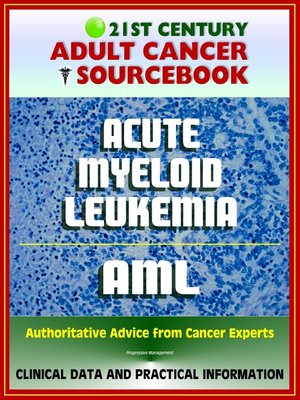21st Century Adult Cancer Sourcebook
ebook ∣ Adult Acute Myeloid Leukemia (AML), ANLL, Myelogenous or Myeloblastic Leukemia--Clinical Data for Patients, Families, and Physicians
By Progressive Management

Sign up to save your library
With an OverDrive account, you can save your favorite libraries for at-a-glance information about availability. Find out more about OverDrive accounts.
Find this title in Libby, the library reading app by OverDrive.



Search for a digital library with this title
Title found at these libraries:
| Loading... |
Authoritative information and practical advice from the nation's cancer experts about acute myeloid leukemia (AML) includes official medical data on signs, symptoms, treatment options, drugs, chemotherapy, staging, biology, prognosis, and survival, with a complete glossary of technical medical terms and current references. Starting with the basics, and advancing to detailed patient-oriented and physician-quality information, this comprehensive in-depth compilation gives empowered patients, families, caregivers, nurses, and physicians the knowledge they need to understand the diagnosis and treatment of acute myeloid leukemia.Adult acute myeloid leukemia (AML) is a cancer of the blood and bone marrow. This type of cancer usually gets worse quickly if it is not treated. It is the most common type of acute leukemia in adults. AML is also called acute myelogenous leukemia, acute myeloblastic leukemia, acute granulocytic leukemia, and acute nonlymphocytic leukemia. Normally, the bone marrow makes blood stem cells (immature cells) that develop into mature blood cells over time. A blood stem cell may become a myeloid stem cell or a lymphoid stem cell. The lymphoid stem cell develops into a white blood cell. The myeloid stem cell develops into one of three types of mature blood cells: Red blood cells that carry oxygen and other materials to all tissues of the body; white blood cells that fight infection and disease; and platelets that help prevent bleeding by causing blood clots to form.In AML, the myeloid stem cells usually develop into a type of immature white blood cell called myeloblasts (or myeloid blasts). The myeloblasts in AML are abnormal and do not become healthy white blood cells. Sometimes in AML, too many stem cells develop into abnormal red blood cells or platelets. These abnormal white blood cells, red blood cells, or platelets are also called leukemia cells or blasts. Leukemia cells can build up in the bone marrow and blood so there is less room for healthy white blood cells, red blood cells, and platelets. When this happens, infection, anemia, or easy bleeding may occur. The leukemia cells can spread outside the blood to other parts of the body, including the central nervous system (brain and spinal cord), skin, and gums.Comprehensive data on clinical trials related to AML is included - with information on intervention, sponsor, gender, age group, trial phase, number of enrolled patients, funding source, study type, study design, NCT identification number and other IDs, first received date, start date, completion date, primary completion date, last updated date, last verified date, associated acronym, and outcome measures.Extensive supplements, with chapters gathered from our Cancer Toolkit series and other reports, cover a broad range of cancer topics useful to cancer patients. This edition includes our exclusive Guide to Leading Medical Websites with updated links to 81 of the best sites for medical information, which let you quickly check for updates from the government and the best commercial portals, news sites, reference/textbook/non-commercial portals, and health organizations. Supplemental coverage includes:Levels of Evidence for Cancer Treatment StudiesGlossary of Clinical Trial TermsClinical Trials Background Information and In-Depth ProgramClinical Trials at NIHHow To Find A Cancer Treatment Trial: A Ten-Step GuideTaking Part in Cancer Treatment Research StudiesAccess to Investigational DrugsClinical Trials Conducted by the National Cancer Institute's Center for Cancer Research at the National Institutes of Health Clinical CenterTaking Time: Support for People with CancerFacing Forward - Life After Cancer TreatmentChemotherapy and You






